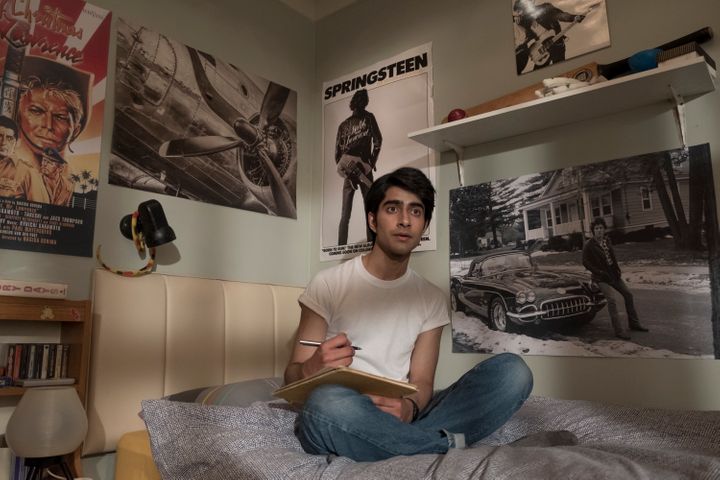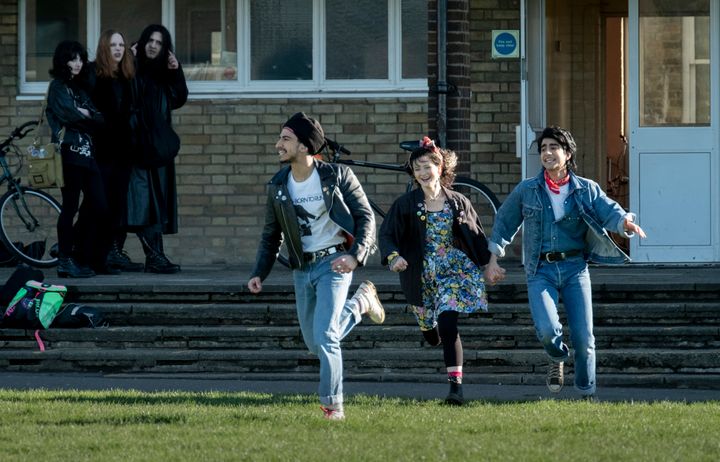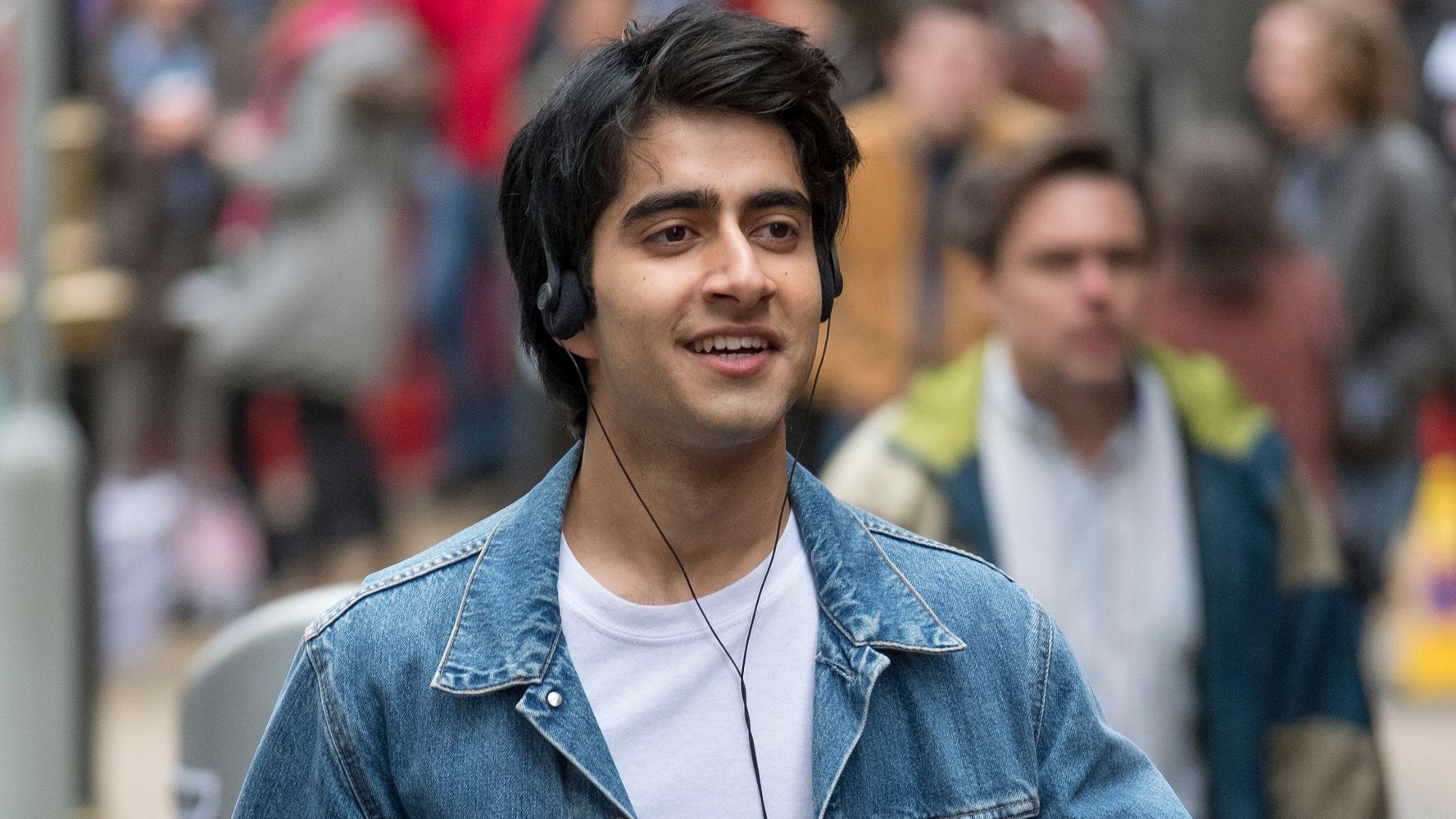[ad_1]
New Jersey is a metaphor. It exists defiantly, sandwiched between two rebelliously distinct metropolises (New York City and Philadelphia). It welcomes mostly anyone — the bad, the good, the very good. It boasts a smattering of ecosystems, too, from beaches to cities to cranberry bogs to mountains. Its identity is strong but ever-changing. You’ll always move around there — a vessel of highways and boulevards in which New Jerseyans are free to always go. There’s a reason so many natives ask new Garden State friends “What exit do you live off of?”
But what happens when New Jersey becomes a state of mind? You get a damn good Bruce Springsteen song — and the film “Blinded by the Light.”
Directed by Gurinder Chadha (“Bend It Like Beckham,” “Bride and Prejudice”) and based on the 2007 memoir “Greetings From Bury Park” by Sarfraz Manzoor, the coming-of-age film tells the story of a British Pakistani Muslim teen named Javed growing up in the late 1980s who discovers himself through the songs and lyrics of Bruce Springsteen. Through Springsteen’s music, Javed explores identity, romance and his relationship to his parents — all while white supremacy and economic stress infiltrate his town.
The soundtrack, of course, delivers the hits and everything in between that any Springsteen fan would want, including a beautiful reimagining of “Jungleland” — Chadha told HuffPost his music is very important to her and like an “old friend.” Beyond the film’s heart, “Blinded By The Light” shows characters oft not prioritized in Hollywood. Seeing their stories unfold feels as euphoric as a saxophone hitting a high note.

Javed, played by brilliant newcomer Viveik Kalra, longs to escape the industrial working-class town of Luton, which sits less than 50 miles outside of London. He writes poems about such dreams. As Springsteen’s stomping grounds in Asbury Park, New Jersey, are “in the shadow of Manhattan,” Chadha told HuffPost, “Luton is always in the shadow of London.”
While Luton and Asbury Park could be kindred spirits of sorts, “Blinded by the Light” really succeeds in outlining the blistering underbelly of white supremacy in the U.K. during the time. The film shows several instances in which members of the the National Front, a fascist British political party, terrorize immigrant families. Javed is followed by a skinhead at one point. The audience also sees townspeople defile a local mosque with a pig’s head. There’s a chilling scene in which young white children urinate on the door of a Pakistani immigrant’s home. It happens so frequently, the occupant admits to Javed and his father, that they had to put plastic down by the entryway inside.
The grips of white supremacy come to a frightening crescendo in a scene in which the National Front march through Luton, causing chaos and violence.

Chadha admits that it was the most emotionally challenging scene to film. When the extras walked around set donning Nazi apparel and brandishing signs with swastikas, the director said, it felt “really, terribly sad.”
“It brought all of that terror back that you somehow pocketed, put away, from the ’80s,” Chadha said. “When we did the first take, everybody who was over 35 sort of just stopped in their tracks because it was so harrowing. It brought it all back.”
Even the extras felt disturbed by their roles. At one point Chadha told HuffPost that an assistant director ushered her to the actors, who were upset after several takes of the NF march. Chadha spoke with them to assure them and ultimately rile them up to finish production of the scene.
Chadha, who says she’s been listening to Springsteen all of her life, also revealed that she was given special permission from The Boss to use his 1975 song “Jungleland” during the NF march scene.
“I just heard Clarence’s saxophone playing over those marches as a way of subverting the hate. I couldn’t do it without asking Bruce. So I came to New York and after [his] Broadway show, I met him.”
After she asked for his permission –– just to use Clarence Clemons’ crooning saxophone from the song –– Bruce agreed it was a good idea.
“He said, ‘I think Clarence would really love that.’ That whole scene is even more special to me because of the way he said that Clarence would love that. I personally thought it was very spiritual,” Chadha said.
Beyond the Springsteen adoration, the film serves as a refreshing and necessary source of representation. Through Manzoor’s storytelling and Chadha’s lens, viewers witness real obstacles South Asian immigrants faced when coming to a country then led by Prime Minister Margaret Thatcher. There are several highs, too. Every character in “Blinded by the Light” gets loving character development, from Javed’s parents played by the scene-stealing actors Kulvinder Ghir and Meera Ganatra, to Roops, portrayed by the charming Aaron Phagura, Javed’s Sikh friend who hands him his first Springsteen cassette tapes. You’ll laugh with them, cry with them and root for them.
At the end of the film, Javed recites his piece “My American Dream in Luton” to his class. He declares that Springsteen represents “not only American values, but the best of human values.” He recognizes that his desire to leave Luton does not mean he should or will reject the life his family worked tirelessly to cultivate.
“I know that having dreams doesn’t make me a bad son,” he says. “I also know that everything I am is because of the sacrifices my mom and dad made.”
Bruce and Javed have different backgrounds, sure, but they cling to hope tirelessly and fiercely. Whether it’s walking down the streets of Luton or hopping on a New Jersey Transit bus to Asbury Park, “Blinded by the Light” encapsulates everything you might feel while wearing a proper jean jacket, cranking “Dancing in the Dark” in your headphones and running into your freeing, terrifying future.
“Blinded by the Light” opens nationwide on Aug. 16.
REAL LIFE. REAL NEWS. REAL VOICES.
Help us tell more of the stories that matter from voices that too often remain unheard.
[ad_2]
Source link

